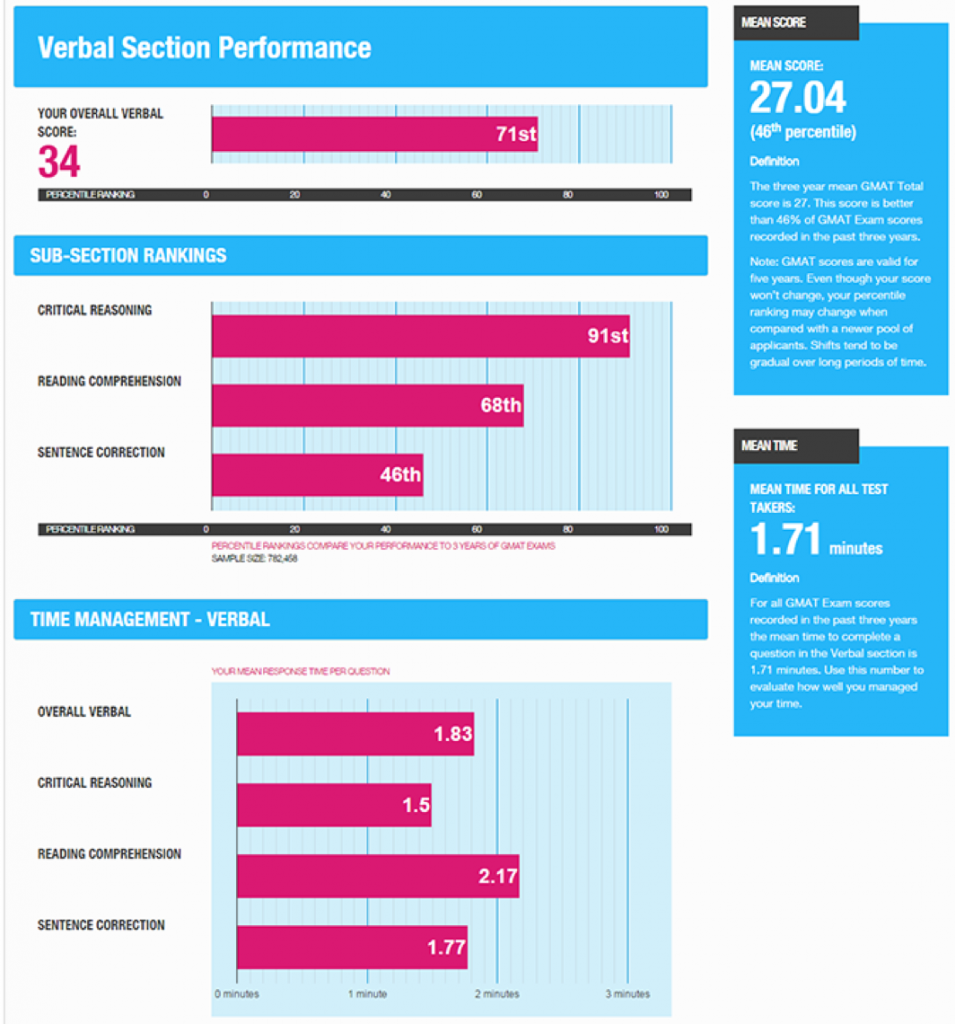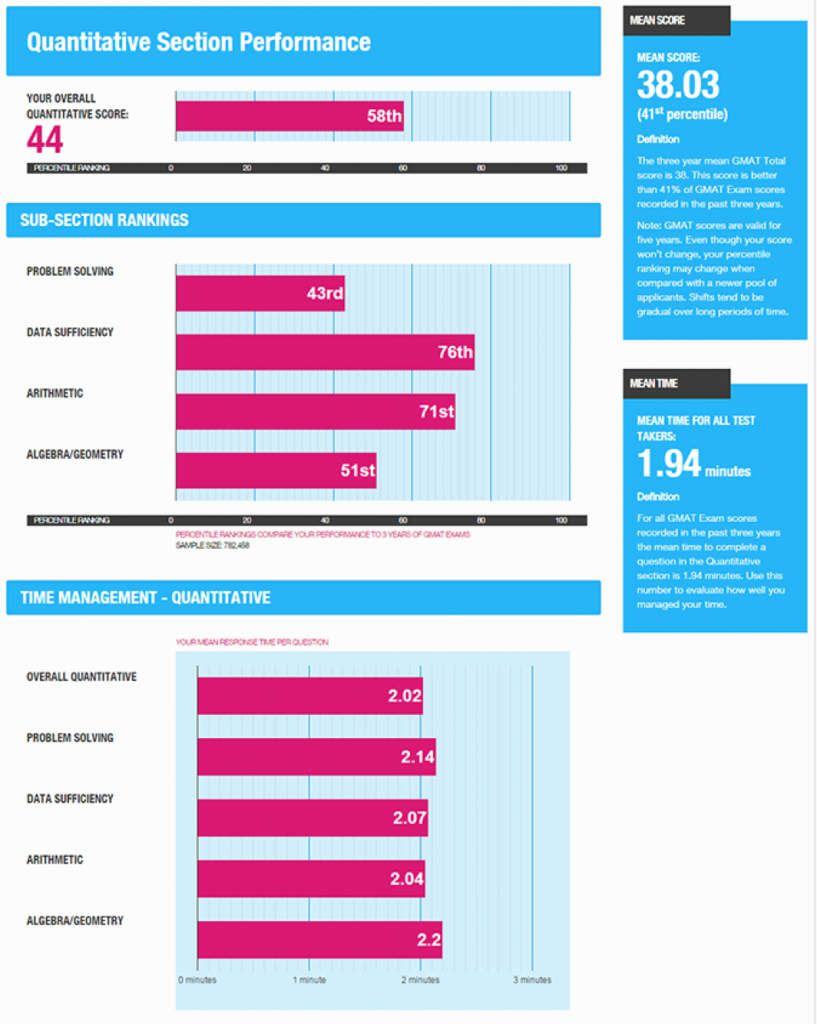-
Target Test Prep's 2024 GMAT Focus Edition prep is discounted for the BTG community!
Redeem
The GMAT Is Now Offering an Enhanced Score Report
 Big news from GMAC, the makers of the GMAT! Starting January 29th, you can order an Enhanced Score Report (ESR) that will contain all kinds of nifty data from your official GMAT CAT. Ive got all of the details below, but first Ill address a few frequently asked questions that will be on everyones mind.
Big news from GMAC, the makers of the GMAT! Starting January 29th, you can order an Enhanced Score Report (ESR) that will contain all kinds of nifty data from your official GMAT CAT. Ive got all of the details below, but first Ill address a few frequently asked questions that will be on everyones mind.
The ESR:
- Costs $25.
- Is available for any GMAT taken from October 2013 forward, as long as you are still within the 5-year window from the date of the exam (which everyone is right now!).
- Contains great data such as: percentage correct by question type and certain content areas; average time by question type and certain content areas.
- Is available even if you cancel your score!
Read on for more.
Why did they create this report?
The motivation was primarily student-driven. Test-takers naturally want more data about their strengths and weaknesses for a variety of reasons, some obvious and some not so (more on this later). Spokesperson Rich DAmato, speaking on behalf of GMAC, told me that they have been beta-testing the ESR with students for the past year, exploring what students would want to see, how they would use the information, and how best to display that information visually so that it is easy to analyze.
In fact, Rich said something that impressed me enough to write down verbatim: We spent a great deal of time listening. So thank you to all of the beta-tester GMAT takers who gave their time and thoughtful opinions to help develop these reports, which will help all of the rest of us going forward.
Rich was also very clear that they are not done listening! As they hear more from you about what is useful and what else you would like to know, they will likely release even better future versions, so please speak up and send in your feedback.
Whats in the report?
The report starts by telling you all of the info you already have: your scores for the Quant, Verbal, and IR sections. (Note: the report will not include any special or extra information about your essay score or performance.)
The first page will also tell you your average time spent per question for each section. (Aside: I don't find this particular information all that useful. If you finished a section roughly on time, then your average is going to be about the same as everyone elses. If you didnt finish a section, you already know that, so knowing the overall timing average doesnt tell you much. But there are some later sub-sections for which the timing data is more useful.)
The next page starts to delve more into the detail of the test. For the Integrated Reasoning section, youll learn the percentage of questions that you answered correctly (very interesting!), as well as your average timing for correct vs. incorrect questions. That timing data could be quite useful if it shows, for example, that you spent way too much time on the incorrect ones.
Next, youll get some great data for Verbal and Quant. First, youll see your rankings across question type. For instance, in the below screen shot of a Verbal report, the (fictitious) test-taker scored in the 91st percentile on CR (wow!) but only the 46th percentile on SC. Clearly, this tester will want to concentrate on SC and RC if she takes the exam again.
Image copyright GMAC, used with permission
The timing data adds to the picture. She scored in the 91st percentile on CR while averaging only 1.5 minutes per question. This efficiency (without sacrificing much, if any, accuracy) allows her to spend more time on the two other question types. Given the percentile rankings for RC vs. SC, she may want to invest some more time when answering questions in her medium area, RC, as a little bit of time investment may be more likely to pay off there.
(Note: your overall score, though, can be brought down by something that is too big of a weakness, so she will still want to study SC quite a bit. She cant blow off that area entirely and still lift her score.)
The Quant portion of the report shows similar data but also breaks things down by Arithmetic and Algebra / Geometry. Take a look:
Image copyright GMAC, used with permission
Id love to know whether all 37 questions are split into one of those two categories (arithmetic vs. algebra / geometry) or whether some questions wouldnt be assigned to either one. Ill research this and get back to you if GMAC discloses any further information.
This student has a clear strength in Data Sufficiency, so shell want to make sure that she doesnt allow herself to rush on those in order to spend more time on Problem Solving. Likewise, shes both more accurate and faster on Arithmetic, so shes got two tasks ahead of her. First, shell obviously want to spend more study time on Algebra and Geometry topics, trying to get better.
Second, though, shell want to remember for her next exam to cut herself off when the algebra and geo questions get too hard. Shell have better luck investing an extra 30 seconds on a harder Arithmetic question, since shes significantly better at those.
When and how can I order it?
Once you receive notice that your official score report is available (usually about 5 to 7 business days after you take the test), you will also be able to order your ESR. Youll see the information to order right there on the mba.com website when you log in to view your official score report.
As I mentioned earlier, you will be able to order your ESR even if you cancel the test scores themselves. This is great news! Chances are good that someone in this situation is going to take the test again, so having this additional data can be really valuable in helping prepare for a re-take.
Should I order it?
If youre going to re-take the test, almost certainly. (I would, but you have to decide for yourself whether you think the information is worth $25.)
Even if youre not going to re-take, you may still want to order it. Rich pointed out that this report could provide you with knowledge about your skills that you might want to reference in an admissions interview. For instance, interviewers commonly ask about weaknesses or areas in which you think you need to improve.
Consider the sample tester above, who is a lot better at DS than PS. This signals that she is good at math thinking (what we call number sense) but struggles more when it comes to actual computation. If this describes you, then you may want to tell the interviewer so and explain that you have enrolled in a math class at your local community college. Thats how dedicated you are to getting your paper math skills up to speed before entering b-school!
(Note: you may be worried about pointing out to a school that youre struggling with something quant-related. Theyve already seen your test scores; they know. They still want to interview you, though, so address any problem areas head on.)
Even if an interviewer doesnt ask about weaknesses, you may still want the data to help give yourself a boost before starting school. For instance, the ability to read efficiently while still taking in the information effectively is a huge advantage in graduate school. If the ESR shows that youre struggling in Reading Comprehension relative to your peers (based on your percentile ranking), then youll know that you need to work on this skill before you enter b-school.
(I would never have thought of this angle myself; thanks, Rich, for enlightening me!)
In short, the ESR is great news for anyone who wants to re-take the GMAT, and even those happy with their scores may find the data useful for other reasons. If youd like to take a look at the full sample report and read more about the features, take a look at GMACs announcement page.
Questions? Comments? If you buy the report, let us know what you think!
[Editor's note:This information has been updated. Click here for the updated GMAT Enhanced Score Report.]
Recent Articles
Archive
- May 2024
- April 2024
- March 2024
- February 2024
- January 2024
- December 2023
- November 2023
- October 2023
- September 2023
- July 2023
- June 2023
- May 2023
- April 2023
- March 2023
- February 2023
- January 2023
- December 2022
- November 2022
- October 2022
- September 2022
- August 2022
- July 2022
- June 2022
- May 2022
- April 2022
- March 2022
- February 2022
- January 2022
- December 2021
- November 2021
- October 2021
- September 2021
- August 2021
- July 2021
- June 2021
- May 2021
- April 2021
- March 2021
- February 2021
- January 2021
- December 2020
- November 2020
- October 2020
- September 2020
- August 2020
- July 2020
- June 2020
- May 2020
- April 2020
- March 2020
- February 2020
- January 2020
- December 2019
- November 2019
- October 2019
- September 2019
- August 2019
- July 2019
- June 2019
- May 2019
- April 2019
- March 2019
- February 2019
- January 2019
- December 2018
- November 2018
- October 2018
- September 2018
- August 2018
- July 2018
- June 2018
- May 2018
- April 2018
- March 2018
- February 2018
- January 2018
- December 2017
- November 2017
- October 2017
- September 2017
- August 2017
- July 2017
- June 2017
- May 2017
- April 2017
- March 2017
- February 2017
- January 2017
- December 2016
- November 2016
- October 2016
- September 2016
- August 2016
- July 2016
- June 2016
- May 2016
- April 2016
- March 2016
- February 2016
- January 2016
- December 2015
- November 2015
- October 2015
- September 2015
- August 2015
- July 2015
- June 2015
- May 2015
- April 2015
- March 2015
- February 2015
- January 2015
- December 2014
- November 2014
- October 2014
- September 2014
- August 2014
- July 2014
- June 2014
- May 2014
- April 2014
- March 2014
- February 2014
- January 2014
- December 2013
- November 2013
- October 2013
- September 2013
- August 2013
- July 2013
- June 2013
- May 2013
- April 2013
- March 2013
- February 2013
- January 2013
- December 2012
- November 2012
- October 2012
- September 2012
- August 2012
- July 2012
- June 2012
- May 2012
- April 2012
- March 2012
- February 2012
- January 2012
- December 2011
- November 2011
- October 2011
- September 2011
- August 2011
- July 2011
- June 2011
- May 2011
- April 2011
- March 2011
- February 2011
- January 2011
- December 2010
- November 2010
- October 2010
- September 2010
- August 2010
- July 2010
- June 2010
- May 2010
- April 2010
- March 2010
- February 2010
- January 2010
- December 2009
- November 2009
- October 2009
- September 2009
- August 2009

